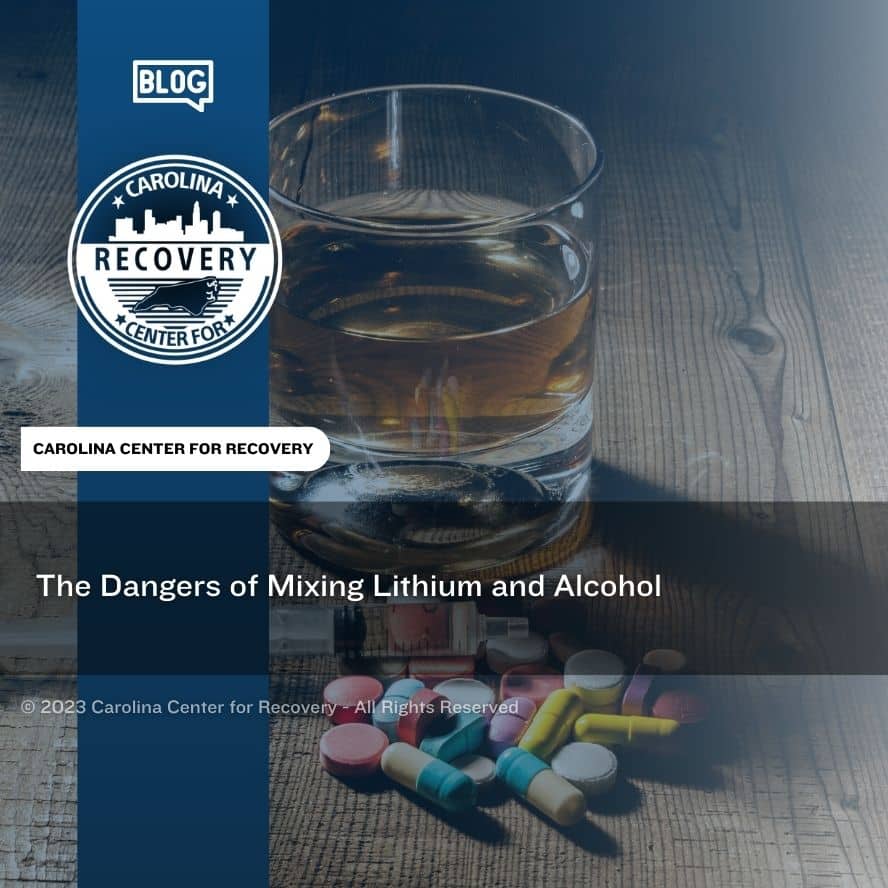The Dangers of Mixing Lithium and Alcohol

Medically Verified: 2/1/24
Medical Reviewer
Chief Editor

All of the information on this page has been reviewed and verified by a certified addiction professional.
Many people take medications to manage the symptoms of a mental health condition. People with bipolar disorder may take a drug called lithium to reduce the risk of suicidal thoughts and other symptoms of this condition.
Lithium helps with bipolar disorder symptoms and improves functioning. People must follow their doctor’s instructions when taking it and avoid mixing it with other substances that could cause problems.
People taking lithium should avoid drinking alcohol to prevent the risk of complications. This article will provide an overview of what lithium is, how it works, and why mixing lithium and alcohol can be dangerous. Contact the Carolina Center for Recovery specialists to learn more or explore our comprehensive addiction treatment programs.
What is Lithium?
Lithium (lithium carbonate) is a mood-stabilizing medication. It can help people with certain mood disorders regulate and control their emotions. Doctors may prescribe it when treating bipolar disorder, depression, schizophrenia, and other mental health conditions.
People typically begin taking lithium in an inpatient hospital setting. Lithium is available in several forms, including:
- Capsule
- Tablet
- Extended-release tablet
- Oral solution
Lithium works by changing how the brain releases chemicals like serotonin and dopamine. These neurotransmitters are involved with emotional regulation and pleasure.
The Side Effects of Lithium
Like other medications, lithium can cause side effects. Some of the most common side effects of lithium include:
- Rash
- Changes in taste
- Appetite changes
- Depression
- Dry mouth
- Excessive salivation
- Increased gas
- Headache
- Indigestion
- Itching
- Muscle pain
- Joint soreness
- Restlessness
- Stomach pain
- Brittle fingernails
- Swollen lips
- Hair loss or thinning
- Weight changes
- Heightened sensitivity to cold temperatures
Drinking alcohol can worsen these side effects. It is crucial to avoid consuming alcohol when taking lithium.
If someone with bipolar disorder takes lithium and drinks alcohol, their mental health symptoms may become more intense. Contact the experts at the Carolina Center for Recovery to learn about the risks of mixing lithium and alcohol. You can also find out about our comprehensive treatment options. Elevated lithium levels can be life-threatening. If you or someone near you has a level of lithium that is too high, seek medical help right away.
What Are the Risks of Mixing Lithium and Alcohol?
Alcohol and lithium both affect the central nervous system (CNS) and can cause mood-altering effects. Alcohol can decrease the benefits of lithium and increase the risk for adverse effects.
Generally, drinking alcohol can worsen the effects of a mood disorder or other mental health conditions. If someone who takes lithium to treat the symptoms of bipolar disorder drinks alcohol, they may experience more intense mental health symptoms.
There are other risks associated with mixing alcohol and lithium. Lithium levels must remain consistent to be effective and prevent complications. If a person were to drink alcohol while taking lithium, it could impact their lithium levels.
Alcohol can be dehydrating. Dehydration can increase the concentration of lithium in the blood and cause lithium toxicity.
Some common symptoms of lithium toxicity include:
- Diarrhea
- Vomiting
- Stomach pain
- Fatigue
- Tremors
- Uncontrollable movements
- Weakness
- Drowsiness
Severe lithium toxicity can be life-threatening. Symptoms include:
- Heightened reflexes
- Seizures
- Agitation
- Slurred speech
- Kidney failure
- Rapid heart rate
- Hyperthermia
- Uncontrollable eye movements
- Low blood pressure
- Confusion
- Coma
- Delirium
- Death
While lithium toxicity can happen for many reasons, drinking alcohol can increase the risk of it. It is critical to avoid alcohol when taking lithium.
Do I Need Alcohol Addiction Treatment?
Doctors typically advise patients taking lithium to stop drinking alcohol altogether. For some, this can be challenging. Heavy or prolonged alcohol use can change how the brain and body work, making it very difficult to stop drinking when you choose. If you struggle to control or stop drinking, you may require treatment for alcohol abuse or addiction.
But how can you determine when it’s time to get help for alcohol addiction? Addiction means losing control over your alcohol intake. People who are addicted to alcohol will continue to drink, even if it is harmful to their health and well-being. They do not choose to drink–they must drink to function.
Some signs of alcohol addiction include:
- Needing to drink a lot to get “buzzed”
- Being able to drink a lot without appearing drunk or feeling hungover later
- Drinking at inappropriate times, such as right away in the morning or at work
- Avoiding events where alcohol isn’t available
- Being secretive about drinking
- Isolating or only spending time with people who drink
- Losing interest in hobbies, responsibilities, or relationships
- Experiencing new or worsening mental health symptoms
- Having withdrawal symptoms if they stop drinking
- Taking risks while drinking, such as driving, having sex, or taking other substances that could harm them
- Wanting to stop drinking but finding it’s impossible to do so
Alcohol abuse and addiction are complex conditions that require comprehensive treatment and ongoing support.
Learn More About Mixing Lithium and Alcohol
Reach out to the specialists at the Carolina Center for Recovery to learn more about the risks of mixing lithium and alcohol or to explore our comprehensive treatment programs. People with bipolar disorder may use lithium to lower the chance of suicidal thoughts and other symptoms.

